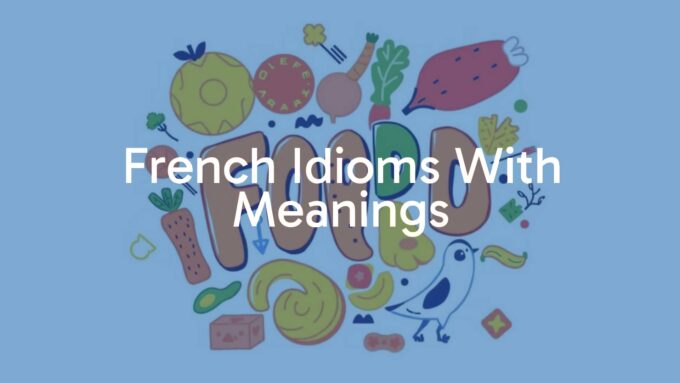If you’ve started learning French, you’ve probably come across some words that look or sound very similar to English, making it easy to think they have the same meaning. However, these words, known as French false friends or “faux amis,” often have very different definitions from what you might expect. These misleading words can cause confusion, mistakes, and sometimes awkward moments in conversation. Learning about these tricky pairs is important, as it can help you avoid common mistakes and improve your French skills.
What Are French False Friends?
The phrase “faux amis,” meaning “false friends,” became popular after the 1928 book by Maxime Kœssler and Jules Derocquigny, which focused on these words in French and English. Because French and English have a long history together, with many words borrowed from one language to the other, it’s common to see words that look alike. Over time, though, some of these lookalike words changed their meanings, creating false friends. You can think of them as two siblings who look almost the same but have very different personalities and interests. It’s easy to confuse them, but their meanings are not the same.

How Are False Friends Different from Cognates?
It’s important to know the difference between false friends and cognates. Cognates are words in different languages that look or sound very similar and also have the same meaning. For example, “accident” in both French and English means the same thing. These are helpful for learners. False friends, however, are words that look or sound similar but have different meanings. They may have come from the same original word, but their meanings changed separately over time.
Why Do So Many French False Friends Exist?
This is mostly because of history. After the Norman Conquest in 1066, French became the language of the ruling people in England, and many French words made their way into English. In fact, about 30% of English words come from French. But as the two languages developed in their own ways, some words kept their meaning while others changed. This is why so many French and English words look similar but can mean something completely different, causing trouble for learners.
How Do French False Friends Cause Confusion?
When learning a new language, it’s natural to guess the meaning of a word if it looks or sounds like something in your language. Sometimes this works, but with false friends, it often leads to mistakes. You might use a word, thinking you know what it means, only to find out later you misunderstood or said something embarrassing by accident.
Typical Mistakes Learners Make
A common error is translating directly by appearance. For example, a learner might see “librairie” and think it means “library,” but it actually means “bookshop.” Or, they might think “attendre” means “to attend,” when it really means “to wait for.” These mistakes happen because the words seem familiar, but their meanings are different.
Verbs can be tricky too. For example, using “introduire” (which means “to insert”) when you mean “to introduce (someone)” can create confusion or make sentences sound odd. Because there are so many of these words, even advanced learners can make these mistakes sometimes.

Examples of Misunderstandings in Conversation
Using false friends in conversation can sometimes lead to funny or embarrassing moments. For instance, saying “Je suis excité” to say you are excited can actually mean you are sexually aroused in French, rather than just happy or enthusiastic. Or, you might ask for a “préservatif” when you want a food preservative, but in French, this means “condom.” These examples show why it is so important to learn the real meanings of lookalike words.
French False Friends List: Common Words and Their Real Meanings
To help you avoid these usual problems, here is a list of some frequent French false friends, their actual meanings, and what you should say instead in each language:
| French Word | Looks Like (English Word) | Real English Meaning | Correct French Word for the English Meaning |
|---|---|---|---|
| Attendre | Attend | To wait (for) | Assister à, participer à |
| Bras | Bra | Arm | Soutien-gorge |
| Location | Location | Rental | Lieu, endroit |
| Librairie | Library | Bookstore | Bibliothèque |
| Préservatif | Preservative | Condom | Conservateur |
| Sensible | Sensible | Sensitive | Raisonnable |
| Journée | Journey | Day, daytime | Voyage |
| Blessé | Blessed | Hurt, injured | Béni |
| Envie | Envy | Desire, want | Envier (for “to envy” as a verb) |
| Pain | Pain | Bread | Douleur |

Attendre / Attend
“Attendre” in French means “to wait for.” If you want to say “to attend,” you should use “assister à” or “participer à.”
Bras / Bra
“Bras” in French means “arm.” “Bra,” the undergarment, is “soutien-gorge” in French.
Location / Location
In French, “location” means “rental.” If you mean a place or location, say “lieu” or “endroit.”
Librairie / Library
“Librairie” means “bookshop.” A “library” is called “bibliothèque” in French.
Préservatif / Preservative
“Préservatif” means “condom.” For food preservative, use “conservateur.”
Sensible / Sensible
“Sensible” means “sensitive.” If you mean “sensible” as in reasonable, use “raisonnable.”
Journée / Journey
“Journée” simply means “day.” For “journey,” the right word is “voyage.”
Blessé / Blessed
“Blessé” means “injured” or “hurt.” If you want to say “blessed,” use “béni.”
Envie / Envy
While “envier” means “to envy,” the noun form “envie” (as in “avoir envie de”) means “to want” or “to feel like.”
Pain / Pain
“Pain” in French is “bread.” “Pain” in English, meaning “suffering,” is “douleur” in French.
Common Ideas Learners Have about French False Friends
Many learners think that if a word looks the same, it must mean the same thing. But this is not always true. Directly translating every word can lead to big mistakes, especially with false friends. It’s important to remember that words can change meaning over time or have different meanings depending on culture and use.
Why Direct Translation Doesn’t Always Work
Words can look the same in French and English and still mean very different things. For example, “déception” in French means “disappointment,” not “deception.” Translate words carefully and double-check them, especially if you are unsure.
Different Meanings and Contexts
False friends can also have different uses, not just different meanings. For example, “formidable” in French means “great” or “fantastic,” while in English it usually means “frightening” or “difficult.” “Actuellement” in French means “currently,” but “actually” in English means “in fact.” Understanding these words in real sentences helps avoid confusion.
Tips for Avoiding Mistakes with French False Friends
To remember false friends and use them correctly, you need to practice and pay attention to the details. Here are some helpful tips:
How to Learn Risky Words
- Make flashcards: Write the French word on one side, its real English meaning, and the correct French translation for the English lookalike on the other.
- Create funny or unusual pictures in your head to help you remember the differences.
- Use the words in real sentences as soon as you learn them. Write them out or say them aloud.

Good Ways to Practice
- Talk with French speakers or other learners who can correct you if you use a false friend by mistake.
- Watch French movies and TV shows with subtitles, or listen to French podcasts. Pause and look up words that seem familiar but don’t make sense.
- Read French articles, books, or news. The more you see and hear the words in real life, the better you’ll remember their true meaning.
Frequently Asked Questions about French False Friends
What Should I Do If I’m Not Sure About a French Word?
If you are not sure what a word means, check a reliable French-English dictionary. Many online tools and language apps can help. If you’re speaking with a native speaker, just ask them what the word means. Saying something like, “Que veut dire X ?” or “Je ne suis pas sûr(e) de ce mot” shows you want to learn. It’s better to ask than to guess wrong.
Do Other Languages Have False Friends with French?
Yes, French has false friends with many languages, especially those with the same language roots like Spanish or Italian. For example, “salir” means “to leave” in Spanish, but in French, “salir” means “to make dirty.” In Italian, “camera” means “room,” while in French, “caméra” is “video camera.” This isn’t just a French-English problem, but something to watch for in many languages.
What Are True Cognates and How Are They Different from False Friends?
True cognates are words in different languages that look similar and also have the same meaning, like “important” in both French and English. False friends look or sound the same but have different meanings. Knowing which words are true cognates and which are false friends can help you learn faster and avoid mistakes.













Leave a comment